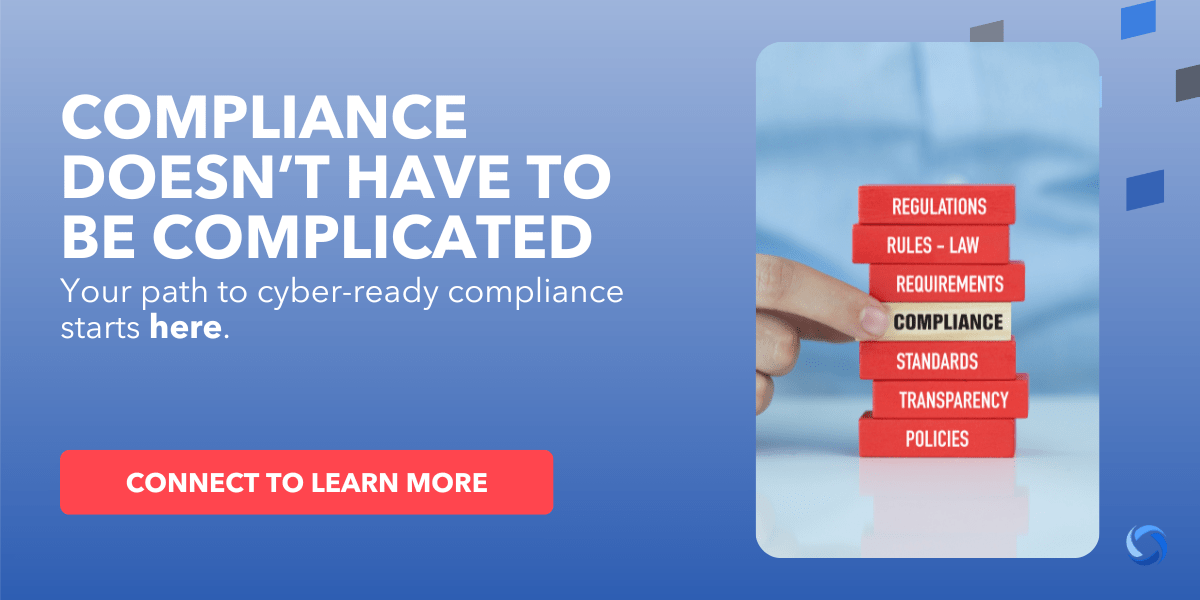As businesses in South Carolina look ahead to 2025, one thing becomes increasingly clear: cybersecurity is a business imperative that directly impacts regulatory compliance. The intersection of cybersecurity risks and compliance is crucial for businesses aiming to protect sensitive data, meet evolving legal requirements, and maintain customer trust. Understanding this relationship is key to ensuring your business can thrive in a world that’s becoming more digital and risk-prone by the day.
This blog explores the growing regulatory landscape, the risks your business faces, and the practical steps you can take to protect your data while meeting compliance standards. Along the way, we’ll examine frameworks like HIPAA, NIST, and CMMC and their impact on your business’s cybersecurity posture. We’ll also highlight how Managed Service Providers (MSPs) like IMS Solutions can help you address this complex terrain, ensuring that your IT strategy not only considers cybersecurity risks but also drives business success.
The Evolving Regulatory Landscape in 2025
Regulatory compliance is becoming more complex and demanding, with new standards and frameworks shaping how businesses approach cybersecurity. Several key regulations will affect businesses in South Carolina, including:
- HIPAA (Health Insurance Portability and Accountability Act): For healthcare organizations, HIPAA is one of the most important regulations, as it sets standards for protecting sensitive patient information. If your business deals with healthcare data, HIPAA’s strict cybersecurity measures—like encryption, access control, and audit logs—are a must.
- NIST (National Institute of Standards and Technology): While NIST standards are not mandatory, they are highly recommended for businesses looking to align their cybersecurity practices with best-in-class guidelines. NIST’s cybersecurity framework provides a comprehensive approach to identifying and mitigating cybersecurity risks, which can be vital for organizations seeking to stay ahead of evolving threats.
- CMMC (Cybersecurity Maturity Model Certification): This regulation primarily impacts defense contractors, requiring them to meet specific cybersecurity standards before they can bid on contracts. However, its impact is broadening, and businesses of all sizes are increasingly adopting its principles to protect sensitive data.
For businesses in Charleston, Greenville, and Spartanburg, these frameworks represent more than just compliance requirements—they are the foundation for managing cybersecurity risks effectively. As these regulations continue to develop, staying informed and compliant is critical to avoiding fines, reputational damage, and the costly consequences of data breaches.
Why Risk Assessment and Insider Threat Awareness Matter
To meet these compliance standards, businesses must conduct regular risk assessments. A risk assessment is the process of identifying potential vulnerabilities in your IT systems and evaluating the potential impact of various threats. This step is critical for achieving compliance with standards like NIST and HIPAA.
A recent survey from the Ponemon Institute found that the average cost of a data breach in the U.S. has increased to $9.44 million in 2024—up from $8.64 million in 2023. Regular risk assessments can help prevent breaches that result from missed vulnerabilities and poor preparedness.
In addition to external threats like ransomware and phishing, businesses must also be aware of insider threats. These are risks that arise from within the organization, whether through malicious intent or simple negligence. Employees who inadvertently expose sensitive information or intentionally steal data can cause irreparable harm to the company’s compliance efforts. That’s why training and awareness programs are essential in identifying potential insider threats and mitigating them before they escalate.
Conducting a thorough cyber risk assessment helps you identify gaps in your current cybersecurity posture, such as outdated software, insufficient access controls, or lack of encryption, which could expose your business to compliance violations. By addressing these vulnerabilities proactively, you position your business to both meet regulatory requirements and protect against threats.
For businesses in South Carolina, partnering with a Managed Service Provider (MSP) can be an excellent way to stay on top of these assessments. An MSP like IMS Solutions can guide you through the process of identifying risks and establishing comprehensive protections against potential breaches.

Aligning IT and Business Strategy to Drive Compliance
Achieving compliance isn’t just ticking off boxes on a checklist—it’s creating a cybersecurity strategy that aligns with your business objectives. When IT strategy and business strategy are in harmony, compliance efforts don’t feel like a burden—they become an integral part of your company’s long-term success.
By aligning your IT and business strategies, you can:
- Improve efficiency: Streamline operations and reduce the time and resources spent on addressing compliance issues by integrating them into daily business functions.
- Enhance data protection: Ensuring that cybersecurity measures support business goals means fewer gaps in data protection and fewer opportunities for breaches.
- Drive growth: Strong cybersecurity can serve as a competitive advantage, especially in industries where customer trust is paramount.
For example, if your business processes sensitive customer data, integrating compliance into your IT strategy ensures that you’re always safeguarding that information. This proactive approach not only meets regulatory standards but also fosters customer confidence and helps you avoid the costly consequences of non-compliance.
An MSP like IMS Solutions can help your business navigate this alignment. We will work with you to integrate cybersecurity into your overall business strategy, ensuring that your IT infrastructure supports compliance goals while also driving business outcomes.
Practical Steps for Safeguarding Sensitive Data
Now that we’ve covered the importance of cybersecurity risk assessments, insider threat awareness, and aligning IT with business strategy, let’s look at some practical steps you can take to safeguard sensitive data and ensure compliance with evolving regulatory standards.
- Conduct Regular Risk Assessments: Identify vulnerabilities in your IT systems and address them before they become major issues. Risk assessments should be done periodically, especially after major changes in your business or IT infrastructure.
- Implement Strong Access Controls: Restrict access to sensitive data based on job responsibilities. Ensure that only authorized employees can access confidential customer or financial information.
- Educate Employees: Provide regular cybersecurity training for your staff. Make sure they are aware of phishing attacks, how to spot suspicious activity, and how to report incidents.
- Use Multi-Factor Authentication (MFA): Implement MFA to add an extra layer of security. This helps protect against unauthorized access, especially if passwords are compromised.
- Monitor Systems Continuously: Continuously monitor your network for unusual activity. This allows you to detect and respond to potential threats in real time.
- Develop an Incident Response Plan: Have a plan in place in case of a security breach. This will help you minimize damage, comply with regulatory reporting requirements, and recover quickly.
- Partner with an MSP: An MSP can help you implement these measures effectively and ensure that your business stays on track with compliance efforts.

Partner with IMS Solutions to Reduce Cybersecurity Risks
With 2025 fast approaching, ensuring that your business is both cybersecurity-ready and regulatory-compliant should be a top priority. With increasing threats like ransomware and phishing, protecting your sensitive data and staying ahead of regulatory changes is essential to your business’s success.
According to the TechAisle 2024 State of Managed Services Report, 72% of businesses that use an MSP report a stronger ability to meet compliance standards compared to those that do not. The expertise and resources that an MSP provides can make all the difference in ensuring that your business not only meets regulatory requirements but also stays ahead of emerging cybersecurity threats. MSPs such as IMS specialize in offering comprehensive IT compliance services, including:
- Risk assessments: Identifying potential risks and vulnerabilities in your systems and processes.
- Advanced security measures: Implementing firewalls, antivirus software, encryption, and other tools to protect sensitive data.
- Ongoing monitoring: Continuously monitoring your systems to detect and respond to security threats in real time.
- Incident response: Developing a clear plan to respond to data breaches or security incidents when they occur.
In addition, MSPs can help you stay up to date with the latest cybersecurity trends and compliance changes. For example, if a new version of HIPAA or NIST guidelines is released, an MSP will help you implement the necessary changes to remain compliant. Take the next step toward safeguarding your business in 2025. Schedule a consultation with IMS Solutions today and ensure that your compliance efforts drive long-term business success.


